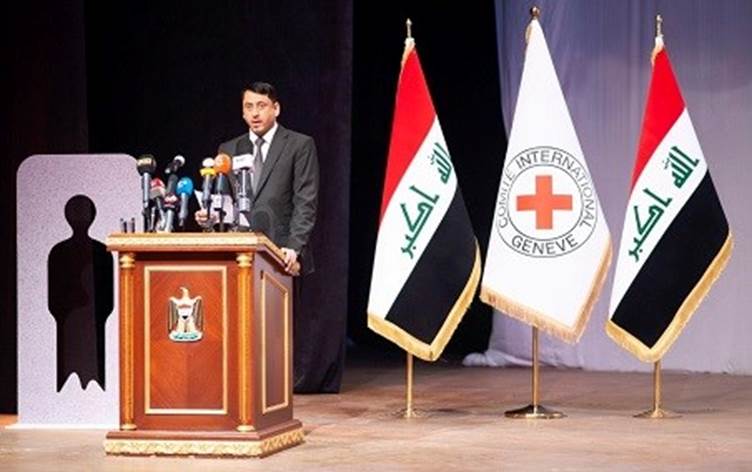Iraq


Secretary General of the Iraqi Council of Ministers Hameed al-Ghathi speaking at an International Committee of the Red Cross event in Baghdad on August 29, 2019. Photo: Iraqi Council of Ministers
prev
next
ERBIL, Kurdistan Region — The International Committee of the Red Cross (ICRC) in Iraq has helped more than 1,500 Iraqis find out the fate of their missing members since the start of 2018.
The figure marks progress, but is just a tiny fraction of the number of missing in Iraq, according to an ICRC spokeswoman.
"The number of the missing is large and has exceeded hundreds of thousands [of individuals]," Salma Ouda told Rudaw in Baghdad on Thursday. “These [1,500 located individuals] are a small dot in the big sea of missing Iraqis.”
The International Committee of the Red Cross helped 1,000 people determine the fate of their missing loved ones in 2018. This year, they have helped 500 families do the same, according to Ouda, who spoke to Rudaw on the sidelines of a joint ICRC-Iraqi government event on the International Day of the Disappeared.
Iraq is a country with a large number of missing people. Four decades of war and turbulence, “Anfal” killing campaigns by the former regime of Saddam Hussein, and the more recent fight against the Islamic State (ISIS), have all made large numbers of Iraqis of many ethnicities and religions go missing.
On Thursday, the Iraqi prime minister’s office, represented by the Secretary General of the Council of Minister Hameed al-Ghathi, participated in the event along with the Kurdistan Regional Government (KRG) Deputy Minister of Martyrs and Anfal Affairs Barvan Hamdi Hussein and ICRC officials. They discussed the plight of the country’s missing, according to an ICRC statement.
“Too many lives have been lost, and countless families remain without news about their missing relatives. The Iraqi government will spare no effort to continue to look into the fate and whereabouts of these missing persons and to bring hope and support to their families,” said Ghathi.
The reasons each Iraqi has gone missing differ, but the results are the same, said the ICRC official leading their delegation to Iraq.
“People who have gone missing have different stories behind their disappearance. But the consequences on those they leave behind are similar,” said head of the delegation of the ICRC in Iraq Katharina Ritz. “Countless times we have seen first-hand the heartbreaking effects of having a missing parent or a child; how desperate mothers struggle to provide for their children; and how families never cease their anxious search for information.”
As of late, three mass graves belonging to Kurds killed by the Hussein regime have been found and exhumed. .
More than 182,000 Kurds were killed in a series of campaigns known as Anfal during the reign of Hussein at the end of the Iran-Iraq war in the late 1980s. The fate of the large majority is still unknown.








Comments
Rudaw moderates all comments submitted on our website. We welcome comments which are relevant to the article and encourage further discussion about the issues that matter to you. We also welcome constructive criticism about Rudaw.
To be approved for publication, however, your comments must meet our community guidelines.
We will not tolerate the following: profanity, threats, personal attacks, vulgarity, abuse (such as sexism, racism, homophobia or xenophobia), or commercial or personal promotion.
Comments that do not meet our guidelines will be rejected. Comments are not edited – they are either approved or rejected.
Post a comment